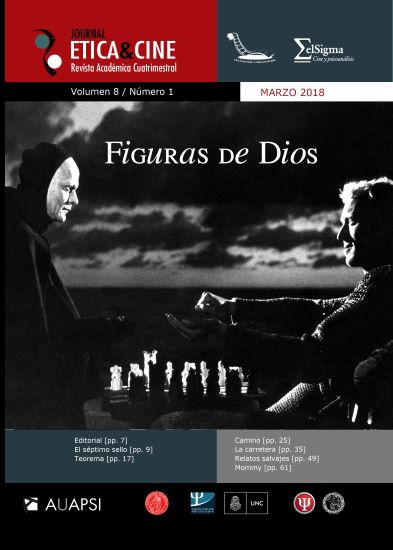Traumatic flights, imaginary parents and neurotic bourgeoisie
DOI:
https://doi.org/10.31056/2250.5415.v8.n1.19844Keywords:
Szifrón, Wild Tales, Lacan, Žižek, Imaginary Father, ArgentinaAbstract
Damián Szifrón’s blockbuster Wild Tales came to the box office as a landmark in Argentinian cinema, not only because it reveals a deep gaze on the aggressive nature of a culture that self-repressed its traumas, but also because every Western culture can contemplate ethically its own scars in this collection of anecdotic tales. Only the fact that Spanish director Pedro Almodóvar would want to produce the work of his young Argentinian counterpart says a lot about the necessity to utilize cinema as a chock therapy where the audience confronts its own wild and primitive nature (The Freudian Id), hidden in its deep interior through centuries of accumulated repression. This article focuses on the figure of the imaginary father, as defined by French analyst Jacques Lacan, in order to explore how the chapters of the film form of chain that presents cultural traumas, historical and individual causes, as well as the neurosis surrounding the Argentinian bourgeoisie, usual ruler of social behavior in the majority of Western societies. In line with the recent work of Slovenian philosopher Slavoj Žižek, this research will observe how each chapter of Wild Tales decomposes the ethical symptoms of a society that is aware of its neurotic behaviors to the point that it acknowledges that comic explosions of its wild sides is the most efficient therapy that cinema can offer.Downloads
References
Crespo-Vila, R. y Piñeiro-Naval, V. (2015) “Del absurdo cotidiano: «Relatos salvajes», de Damián Szifrón”, Actas del III Congreso de Historia, Arte y Literatura en el Cine, Universidad de Salamanca: Salamanca, pp. 559-571.
Dupont, J. (2014) “History, Fantasy, and a Dog’s Life: Cannes 2014”. Film Quarterly, vol. 67, no. 4, pp. 61-66.
Ferrero, A. (2015). “Relatos salvajes”. Review of Relatos salvajes. Chaqui, vol. 44, no. 2, Nov., pp. 369-371.
González, R. et al. (2015) Panorama Del Cine Iberoamericano En Un Contexto Global. Historias Comunes, Propuestas, Futuro. Edited by Ana Sedeño et al., 1st ed., Madrid, Dykinson, S.L.
Page, J. (2009). Crisis and Capitalism in Contemporary Argentine Cinema. Durham and London: Duke University Press, 2009. Rocha, Carolina. “Contemporary Argentine Cinema during Neoliberalism”. Hispania, vol. 92, no. 4, 2009, pp. 841-851.
Sorbille, M. (2007) “Echeverría y ‘El Matadero’: Anticipación Del Mito Freudiano y Paternidad De La Argentina Moderna”. Iberoamericana (2001-), vol. 7, no. 25, pp. 23-42.
Žižek, S. (2008) “Tolerance as an Ideological Category”. Critical Inquiry, vol. 34, no. 4, pp. 660-682.
Žižek, S. (2009) Sobre la violencia: Seis reflexiones marginales. Buenos Aires: Paidós.
Žižek, S. (2008) “A plea for ethical violence”. Online video clip. Youtube. European Graduate School Video Lectures, February 20th. Web. April 15th 2014.
Žižek, S. (2010) Living in the End Times. London and New York: Verso.
Downloads
Published
How to Cite
Issue
Section
License
Los autores que publiquen en Ética y Cine Journal aceptan las siguientes condiciones:
Los autores/as conservan los derechos de autor © y permiten la publicación a Ética y Cine Journal, bajo licencia CC BY-SA / Reconocimiento - Reconocimiento-CompartirIgual 4.0 Internacional. La adopción de esta licencia permite copiar, redistribuir, comunicar públicamente la obra, reconociendo los créditos de la misma, y construir sobre el material publicado, debiendo otorgar el crédito apropiado a través de un enlace a la licencia e indicando si se realizaron cambios.

Este obra está bajo una licencia de Creative Commons Reconocimiento-CompartirIgual 4.0 Internacional.




